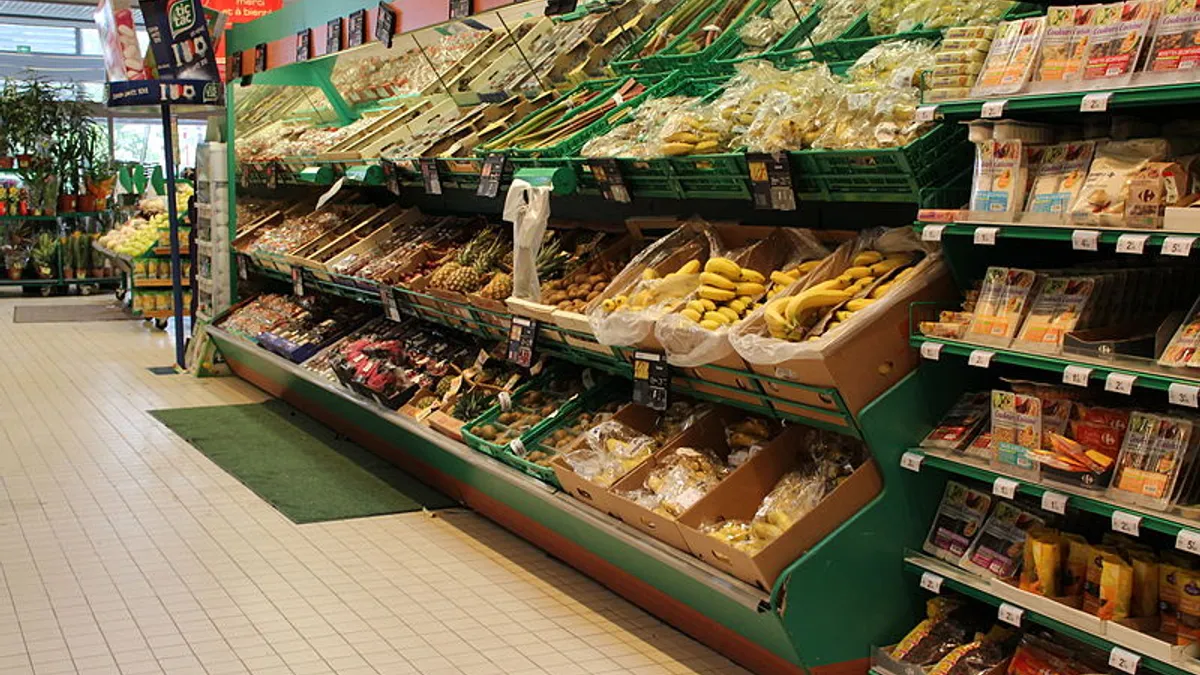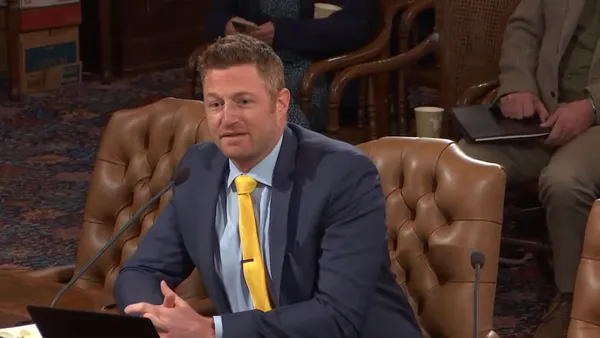Dive Brief:
- Food waste experts are slowly assessing the short and long-term impacts of the new coronavirus, which remain murky. With the fallout likely stretching into coming months, some are worried about supply chain impacts — including food recovery for donation — as well as a future uptick in waste amid dramatic lifestyle alterations.
- Initial volume shifts are unclear at the moment, but a major surge in grocery purchases appears to be driving a decline in food waste associated with retail. Higher education and entertainment venue closures, however, are generating greater amounts than usual, while the shuttering of farmer's markets is also expected to drive an increase in discarded products.
- One concern is public demand for food may lead to an uptick in waste, not only through organics, but through packaging as people shift to takeout and delivery. "I think waste is very low priority [for people right now], but food is very high priority," Dana Gunders, executive director of ReFED, told Waste Dive. Her organization and the Harvard Law School Food Law and Policy Clinic (FLPC) are sharing resources aimed at connecting those issues.
Dive Insight:
As with other parts of the waste and recycling sector, experts say it is difficult to assess at this early stage how the pandemic will ultimately impact food waste volumes as people adapt to dramatically new systems.
"Now more than ever, one of the concerns I've had is making sure that as much food as can be donated gets there first, before we compost [or throw it out]," Emily Broad Leib, FLPC director, told Waste Dive.
In an effort to stem the spread of COVID-19, a number of cities and several states are recommending everything from basic social distancing measures to wide-scale orders to stay at home. While officials have underscored there is no current concern about food insecurity, people have largely been clearing out grocery stores, sparking a reduction in food waste from retail, according to Leib.
That sudden dearth of supply is impacting systems created to channel discarded food items towards those in need, through outlets like food banks and other recovery organizations. Gunders said ReFED was still in the process of obtaining numbers around decreased volumes, but shared anecdotally many groups are having to rethink the logistics behind their work.
"They are concerned about a shortage of food," she said. "A lot of them are just buying food [from stores], and they'll need to do more and more of that as times goes on. They're pretty nervous."
With unemployment spiking dramatically and income concerns rising, these issues could be compounded in coming months. Other sources of concern are also emerging, including farmer's markets. While officials in areas including Washington, D.C. and New York City have exempted farmer's markets from bans on public gatherings due to their function as food retailers, a decline in patrons is forcing their closure regardless, as is a reliance on often elderly volunteers. Those decisions are leaving farmers without a common outlet for income, while potentially driving up waste as a result when they cannot sell their products.
Even as supply chains collapse in some areas, they are momentarily appearing elsewhere. Many schools have closed and sent students home, as have corporate campuses and similar spaces. Some of those closures have come coupled with efforts to reduce food waste. Disneyland, for example, closed last week and said the theme park would donate its excess food to the Second Harvest Food Bank in Orange County, California. Both Gunders and Leib also said universities have reached out to food waste organizations in some cases to assist with overflow.
But other longer-term issues are looming. While cities including San Francisco and New York told Waste Dive their curbside organics collection programs remain ongoing, small-scale organics collection companies in areas such as Boston and New Orleans are suspending or scaling back operations. That means a decline in access to resource recovery efforts, likely spurring an uptick in MSW at the residential level.
Meanwhile, an abrupt shift to takeout from otherwise shuttered restaurants could offer competing advantages and disadvantages for those seeking to curb waste volumes. "I think we're going to move to a lot more food being delivered to homes," said Leib. "In a way, it may lead to increased efficiency ... if people are ordering, you can plan better."
However, that pivot could also generate an uptick in packaging waste outside of food volumes.
"I imagine all of this is going to have a long tail in terms of some of those effects," said Gunders, noting decisions made now could have a severe impact in the months to come.
She hopes answers will come sooner rather than later. ReFED is waiting on the results of survey data offering an idea of food waste shifts and volumes. Gunders said she is optimistic those numbers will become available in the next week or two.














